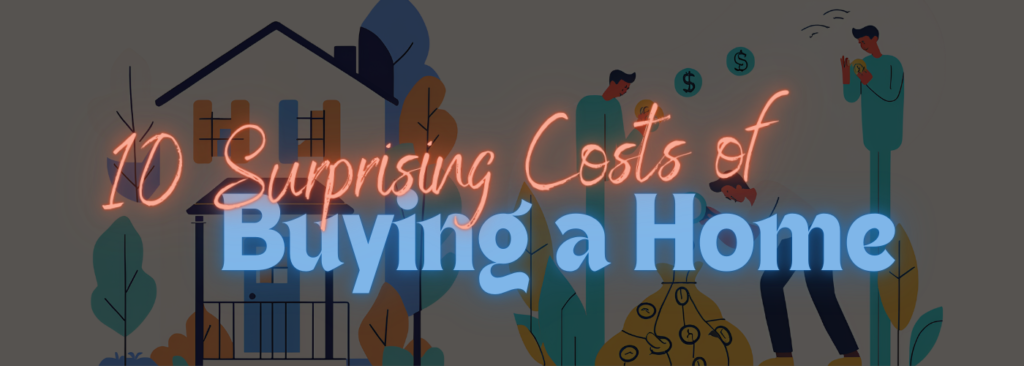Buying a home is an exciting milestone, but it involves more than just the purchase price. Many buyers focus on the down payment and mortgage, only to be surprised or caught off guard by additional expenses. Understanding these hidden costs can help you budget effectively and avoid financial surprises.
1. Closing Costs
Closing costs include a variety of fees required to finalize the real estate transaction. They typically range from 2% to 5% of the home’s purchase price and can include:
- Loan origination fees
- Appraisal fees
- Title insurance
- Attorney fees
- Home inspection costs
- Prepaid property taxes and homeowners insurance
Many buyers underestimate these expenses, so getting an estimate from your lender and factoring them into your budget is essential.
2. Home Inspection Fees
A professional home inspection is crucial before purchasing a property. It helps uncover potential structural, plumbing, electrical, or roofing issues. Inspection costs typically range from $300 to $600, but additional specialized inspections (for mold, radon, or pests) can drive up costs even further.
3. Property Taxes
Property taxes are a significant ongoing expense that many buyers forget to consider. Rates vary by location but can amount to thousands of dollars per year. Some lenders require buyers to prepay several months’ worth of property taxes at closing, which can add a hefty upfront cost.
4. Homeowners Insurance
Most lenders require homeowners insurance, which protects your home against damage or loss. Premiums vary based on location, home value, and coverage level, typically ranging from $800 to $3,000 per year. If your home is in a high-risk area, you may need additional policies, such as flood or earthquake insurance.
5. Private Mortgage Insurance (PMI)
If your down payment is less than 20%, you’ll likely need to pay Private Mortgage Insurance (PMI). This added cost typically ranges from 0.5% to 1% of the loan amount annually. For a $300,000 mortgage, this means paying an extra $1,500 to $3,000 per year until you reach 20% equity in your home.
6. Homeowners Association (HOA) Fees
If your home is in a community with an HOA, expect monthly or annual dues. These fees help cover amenities, landscaping, security, and maintenance of shared spaces. Depending on the neighborhood and its offerings, HOA fees can range from $50 to $500 per month.
7. Moving Expenses
Moving costs can add up quickly, whether you hire professional movers, rent a truck, or purchase packing supplies. Expenses can range from a few hundred dollars to several thousand. If you’re relocating long-distance, additional costs such as travel, temporary lodging, and utility deposits can further increase expenses.
8. Utility Set-Up and Deposits
New homeowners may need to pay deposits to set up essential utilities, including electricity, water, gas, and internet. Depending on your location and provider, these deposits can range from $100 to $500 per service. Monthly bills might also be higher than expected if you’re moving into a larger home.
9. Maintenance and Repairs
Even in homes that pass inspection without major concerns, maintenance and repairs are inevitable. Common expenses include:
- HVAC servicing
- Plumbing or electrical repairs
- Roof maintenance
- Appliance replacements
Experts recommend setting aside 1% to 3% of your home’s value annually for maintenance and unexpected repairs. For a $300,000 home, this means budgeting $3,000 to $9,000 per year.
10. Furnishings and Upgrades
Once you move in, you may need new furniture, appliances, or décor. Even if you bring existing furniture, you might want to update paint colors, lighting fixtures, or landscaping. These costs can escalate quickly, especially if you plan significant upgrades like new flooring or a kitchen remodel.
Summary
Buying a home is a major financial commitment, and being prepared for these hidden costs will help you plan better and avoid unwelcome surprises. By budgeting for these expenses upfront, you can ensure a smoother homebuying experience and enjoy your new home without financial stress.
Before making a purchase, consulting with a real estate agent (like me!) is a smart first step. But don’t forget to speak with a financial advisor to get a full picture of all the costs involved. From there, securing pre-approval for a home loan ensures you’re financially prepared for homeownership. A well-prepared buyer is a confident and successful homeowner!
